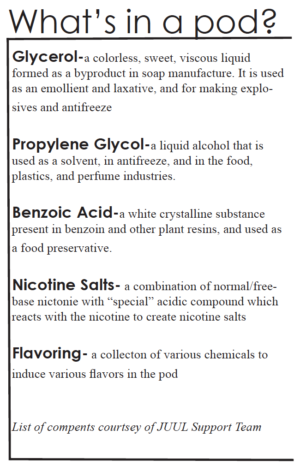Do you bool with a JUUL?
FDA to ban flavored e-cigarrettes
Nov 16, 2018
You enter the bathroom and see a peer taking a long drag from what appears to be a flash drive. A moment later, a slow exhale summons a cloud of smoke hiding their figure behind a fruity mirage of addiction. You quickly realize they’ve been hitting the infamous Juul. With news circulating of the imminent FDA crackdown on Juuls and other e-cigarette brands, one most ask: how did things get to this point?
The presence of nicotine in high school culture is nothing new. The CDC cites that in 2011 15.8 percent of high schoolers had smoked cigarettes in the past 30 days. However in recent years, anti-smoking ads have pushed cigarettes to the background. Only 7.6 percent of high schoolers reported smoking cigarettes in the past 30 days in 2017.
The power vacuum left by cigarettes’ fall from mainstream has sucked e-cigarettes and vapes to the foreground. According to the CDC, 11.7% of high schoolers had used an e-cigarette in the past 30 days in 2017. Many teens are trading their cigarettes for Juuls and Blu e-cigarettes.This issue affects teens nationwide, even in our own backyard. What draws teens to use these products? Is it the fruity flavors the FDA is cracking down on, or does a widespread epidemic of anxiety bring kids to the habit?
The reason teens use nicotine products is an ambiguous one. It was explained by a senior at WCHS who said “The chemical [nicotine] tricks your brain into believing this is a regular way of dealing with stress so you feel the need to do it more, and the more you do it, the more trivial the reason becomes.”
An alternative hypothesis is that students who use believe it has helped them with anxiety. According to the National institute for Mental Health, between 2001 and 2004, 31.9% of adolescents had some sort of anxiety disorder, and this number has continued to grow.
Another reason Juuls and E-cigarettes are widespread with teens is that they are discrete. To smoke a cigarette, you must go to an area you can smoke, stand there, smoke the cigarette, then go back to what you were doing. Also, cigarettes have a bad odor and are known to be bad for you. In contrast, vapes and e-cigarettes have fewer known negative side effects and can be used indoors due to lack of second hand smoke and smell. This makes it much easier for a teen to use one consistently and form an addiction compared to cigarettes.
The FDA’s reports on why teens use e-cigarettes is different from what WCHS students have said themselves. The FDA stated in a statement
published on April 24, that it is marketing and flavors that have teens fiending for their next pod. Juul’s early ads in 2015 featured young adults using their device in an enjoyable social setting to make it appear more appealing. Even the name, “Juul,” references something of high quality. After the company realized teens were using their product, they changed their marketing and used models 35 years and older to better align with their morales. They also changed the names of the pods so that flavors would seem less appealing to teens. They did this by dropping the descriptors on the names. For example, “cool cucumber” was changed to just “cucumber.” Alas, the damage was done. Many teens were already using Juuls and spreading the news of the device by word of mouth and social media.
The FDA aims to dismantle what they believe is still the problem: the flavors. They are set to ban flavoring in pods in the coming weeks. Criticism of this change suggests that eliminating the most popular flavors will hurt sales.
The other issue the FDA is set to tackle is how teens get hold of these products. Students from WCHS  List components courtesy of JUUL Support Team
List components courtesy of JUUL Support Team
shared their insight. Students said either a friend buys them, or they order online. The FDA is well aware of the online sales of what they consider Electronic Nicotine Delivery Systems (ENDS). In the previously mentioned press announcement, FDA Commissioner Mr. Scott Gottlieb alluded to holding the online business that sells ENDS products responsible for the perceived epidemic. The ability to control the online sale of these age-restricted is a difficult one, due to the nature of the internet.
Whether teens are hiding their anxiety behind a fruity mirage, or use it because of demographic-targeting ads and flavors, teens are still using. One WCHS senior wanted to tell the student body the following: “I would tell the kids of WCHS that they may not be see it happening now because they are still looking at vaping through rose tinted glasses, but they are developing a very serious nicotine addiction that can cause harm to your mind and relationships around you.”
